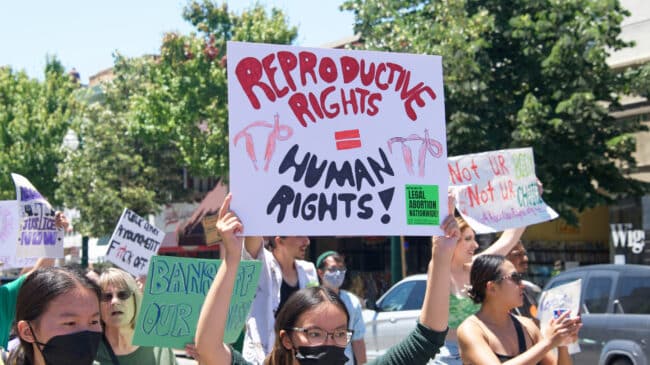Summary
California’s Proposition 1 would add an amendment to the state constitution (Section 1.1, Article 1) prohibiting the state from interfering “with an individual’s reproductive freedom in their most intimate decisions, which includes their fundamental right to choose to have an abortion and their fundamental right to choose or refuse contraceptives.”
The amendment was drafted and passed by both houses of California’s state legislature in response to the U.S. Supreme Court’s May 2022 Dobbs v. Jackson Women’s Health Clinic decision overturning Roe vs. Wade and other precedents. The ballot initiative must pass with a two-thirds majority to be added to the state constitution.
Fiscal Impact
The California Legislative Analyst’s Office found that Proposition 1 would have no fiscal impact because California’s law already provides these rights. Critics and opponents of the amendment as drafted have proposed scenarios in which adding this right to the state constitution would cost the state more due to litigation, potentially broader interpretations of abortion rights than exist by current law, and the provision of abortions to patients from other states. No estimates of these costs have been circulated, and we discuss such scenarios.
Arguments in Favor
Arguments in favor of the amendment come from advocates of abortion rights and are targeted to the majority of California residents that polls show favor abortion rights and oppose the U.S. Supreme Court’s Dobbs v. Jackson Women’s Health Clinic decision. Most of the state’s prominent Democrats, including Gov. Gavin Newsom and majority leaders in the state legislature, have endorsed the amendment, along with groups such as Planned Parenthood Affiliates of California, The League of Women Voters of California, and the California Medical Association.
Proponents argue that while abortion rights are already a part of California law, enshrining them in the state constitution would add another layer of protection. State Assembly Speaker Anthony Rendon’s endorsement is representative of almost all California Democratic officials: “We know from history that abortion bans don’t end abortion. They only outlaw safe abortions. We must preserve the fundamental reproductive rights of women here in California because they are under attack elsewhere.”
While the political nature of the short and simply worded amendment is often used by opponents to dismiss it, many endorsements and op-eds favoring the amendment also suggest Proposition 1 appeals to the state’s majority voters on political grounds. Gov. Newsom says, “California will not sit on the sidelines as unprecedented attacks on the fundamental right to choose endanger women across the country.”
Arguments Against
Arguments against Proposition 1 fall into two distinct categories. The first are straightforward arguments by those who oppose abortion. The California Republican Party, California Conference of Catholic Bishops, and prominent pro-life groups oppose the amendment on grounds familiar to the debate about abortion that has unfolded over several decades.
The second category of arguments against Prop. 1 are best characterized as pragmatic arguments targeted to pro-choice voters. They begin by arguing the amendment will be of limited benefit, as California law already protects abortion rights, and express concerns that adding these protections to the state constitution could entail additional costs and, potentially, new lines of attack on, or risks to, Californians’ abortion rights.
Of particular concern to these pragmatic opponents of Prop. 1 is the very simple wording of the amendment, which some fear could be interpreted by California’s courts as enshrining a broader right to abortion than California, as well as now-overturned precedent in Roe v. Wade, allow. California’s current law places limits on abortion at the point of fetal viability, whereas the wording of the proposed amendment simply refers to the “fundamental right to choose to have an abortion.”
If state courts were to hear a case and rule that the new amendment enshrines a right to all abortions, late-term abortions could be legalized in California. This could be of concern to generally pro-choice California voters, opponents of the amendment argue, for several reasons. First, many who support abortion rights generally may not support late-term abortions. In a San Francisco Chronicle column, Joe Matthew notes recent polling indicating that 70 percent of Californians oppose late-term abortion, numbers almost as high as Californians’ supporting abortion rights earlier in a woman’s pregnancy.
A June 2022 article by legal scholars Allison MacBeth and Elizabeth Bernal urged top-ranking state Democrats to add technical language to the amendment referencing past national legal doctrine—specifically “Griswold v. Connecticut, Roe v. Wade, or Planned Parenthood v. Casey.” The authors argue that citing earlier precedent would effectively limit late-term abortions, while not clarifying the language of the amendment could create a new way for abortion opponents to mount a challenge in federal courts.
The authors of the official argument against Prop. 1 also express concern about California becoming a “’sanctuary state’ for thousands, possibly millions of abortion seekers from other states, at a staggering cost to taxpayers.”
Discussion
Many ballot initiatives in California and other states require the informed voter to familiarize themselves with details of fiscal policy and regulation that are not usually at the forefront of political debate, and on which voters may not have strong opinions when walking into the voting booth. California’s Proposition 1 is just the opposite.
Almost all American voters are familiar with this issue, and most Californians will vote according to whether they believe it should be legal for a woman to get an abortion. Recent polling confirms that a majority of Californians consider themselves pro-choice and that, as of this writing, Prop. 1 seems very likely to pass. California’s pro-life voters are likely to vote against Prop. 1 in overwhelming numbers.
California’s pro-choice voters must decide if there are costs or risks to enshrining the language of the proposed amendment in their constitution. The benefits, from a pro-choice perspective, are the reduced risk of a future state judiciary overturning abortion rights, as well as the political benefits pro-choice voters attach to this contentious issue. While quantifying these benefits is not possible, pro-choice voters must weigh them against the costs laid out by those favoring abortion rights but no constitutional amendment.
It is plausible if not likely that the amendment will create new ground for legal maneuvering and political engagement for pro-life activists in California and nationwide. However, those arguing this point broadly undercut the foundations of the argument that pro-choice voters should not support the amendment—that Californians’ abortion rights are already safe. Pro-choice arguments against the amendment appear to simply ignore that political and legal resistance will continue in the absence of an amendment as well as if it is passed. California is already a political and legal lightning rod for this contentious issue. If we can learn one thing from this seemingly circular argument, it is that activists, lawyers, and energized voters on both sides of the issue will find a way to keep these battles alive not just in California but in all 50 states.
The specific concern about the amendment’s language possibly being flawed is potentially of more concern to pro-choice voters. Opening up new battlegrounds on the particularly hot-button issue of late-term abortions could very likely complicate matters in the future. Citing legal precedents as Allison MacBeth and Elizabeth Bernal proposed may have foreclosed that possibility. Instead, California’s top Democrats and pro-choice groups appear to have opted instead for a simple statement of purpose.
A more carefully worded amendment may have served the dual purpose of preventing legal battles in state court (with the amendment itself) as well as federal courts (with the more precise language). But once again, the idea that either side would simply give up in any scenario, especially in the nation’s largest and most progressive state, is not credible. With future political and legal battles almost guaranteed no matter the amendment’s fate, pro-choice voters may simply value the statement in itself.
Voters’ guides for other propositions on California’s 2022 ballot.

